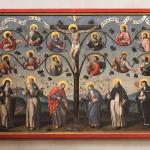
It is easy for us to let pride take control and lead us astray. It is easy to think we know all the answers others need to hear. Once we do, we easily become angry with others when they don’t listen to us. We take it as an affront against us, that is, we take it personally. We shouldn’t, but we do. The more we think we know something others need to know, the easier it is for us to become angry when they don’t heed our so-called wisdom. That anger easily leads to condemnation, as we come to believe that those who don’t listen to us deserve everything which comes their way. What we do not see what is happening to ourselves. Even if we have some extraordinary insight, we have lost the peace and joy which we should have, and so in the end, our anger, our judgmental attitude, helps our own demons take control and lead us to our own condemnation. We lose ourselves, not in the sense of the dying to the self which is necessary for our own rejuvenation, but rather, with the embrace of an egotism which takes control and imprisons us in the state we now find ourselves to be in. We excuse our judgmental attitude, our anger which lies behind it, because we think so much of ourselves. We really believe it all comes from a desire to help others, when in reality, we are lying to ourselves in order to justify our self-reification. When we judge and condemn others, we not only destroy our own spiritual progression, it makes those whom we judge defensive, and so unwilling to change their ways (that is, if they should).
Few people will react positively to cruelty. Few people react positively to being judged and condemned. The excuse we make for ourselves is just that, an excuse. We make it to satisfy our passions. If we understand that, hopefully we will see why we should avoid such a passion, such a judgmental spirit. If we truly want what is best for others, we should treat them with care, showing them compassion so that they know they are loved, that they are accepted for who they are. Saint Macarius the Great understood the reasons why so many of us treat others poorly, all the excuses we give, and said we should not accept them; we should realize the more we give in to such passions, even if we use an excuse such as saying we do it for the good of those we condemn, we ultimately cause our own ruin:
The same Abba Macarius said, ‘If you reprove someone, you yourself get carried away by anger and you are satisfying your own passion; do not lose yourself, therefore, in order to save another.’[1]
It is easy to see how we create excuses for our own bad behavior, not realizing that if we truly want to help others, as we claim we do, we would do so without anger or malice. We would try to understand the other instead of judging them. Indeed, the more we give in to our passion, to anger, the more problems we create for ourselves and for others, “A man of wrath stirs up strife, and a man given to anger causes much transgression” (Prov. 29:22 RSV). The more we give in to anger, the more we will be the ones doing what is ourselves. Sadly, our egotism and the false self we constructed with it, the false self which becomes reified by us, will make sure we do not truly see what we are doing, or if we do, to find reasons to blame everyone else but ourselves for what we do wrong. Likewise, the more we react with hostility towards others, the more they will react in the same way in return, turning towards anger, acting out of anger and malice, creating then a cycle of anger, resentment, and open hostility which will likely lead to all kinds of transgressions from everyone involved. The way out of that cycle is to stop, to not let anger dictate our response. We must stop it when it emerges and react instead with love and compassion. This doesn’t mean we can’t help people change for better, but we will do it without unjust judgment and rash condemnation. We will be patient. We will not treat others as objects to manipulate. We will treat them as subjects, as persons, who possess in them the image and likeness of God and so deem them as someone to respect and lift up as they are.
Macarius also understood that one of our great problems lies in the way we are quick to speak, to let out all our worst thoughts without shame. Without learning how to control our tongue, our communication with each other ends up badly as we speak out and say things which are hurtful to each other. It is better to show love with actions than it is to speak about it. This is why we should learn how to engage and embrace silence, so that we won’t let our worst thoughts get the best of us and come out in in our words. Thus, Macarius told monks under his spiritual guidance that they should flee back to their cells. There they can learn how to be silent, and in that manner, gain control over their tongues:
Abba Macarius the Great said to the brothers of Scetis, when he dismissed the assembly. ‘Flee, my bothers.’ One of the old men asked him, ‘Where could we see to beyond this desert?’ He put his finger on his lips and said, ‘Flee that,’ and he went into his cell, shut the door and sat down. [2]
Macarius gave advice which is follows advice given in Scripture itself. “He who keeps his mouth and his tongue keeps himself out of trouble” (Prov. 21:23 RSV). James, similarly said, “Know this, my beloved brethren. Let every man be quick to hear, slow to speak, slow to anger, for the anger of man does not work the righteousness of God.”(Jas. 1:19-20 RSV). James, therefore connected the tongue, with the evil words which can come out of it, with anger, and the way such anger diverts us from the righteousness of God. We fool ourselves when we think otherwise. We fool ourselves when we think we can use examples of righteous anger to justify our cruel words, suggesting that through them, we are being righteous. We are not when our words come out of malice, or when they come as a desire to control and dominate others. Truly, as Macarius and others knew, anger, and the way it leads us to express ourselves, is a trap, and one which potentially will destroy not only those we lash out at, but ourselves.
[1] The Sayings of the Desert Fathers. trans. Benedicta Ward (Kalamazoo, MI: Cistercian Publications, 1984), 131 [Saying of Macarius the Great #17].
[2] The Sayings of the Desert Fathers, 131 [Saying of Macarius the Great #16].
Stay in touch! Like A Little Bit of Nothing on Facebook.
If you liked what you read, please consider sharing it with your friends and family!













